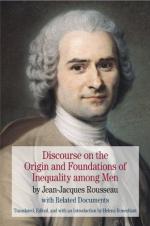|
This section contains 1,216 words (approx. 5 pages at 300 words per page) |

|
Jean-Jacques Rousseau (1712–1778), who was born in Geneva on June 28 and died on July 2 in Paris, was a self-taught genius who became the leading critic of the Enlightenment vision of an essential harmony between science and society, technology and ethics. As a mid-century member of a circle of intellectuals working on the Encyclopédie, a comprehensive attempt to synthesize scientific knowledge and technological skills for social utility, Rousseau's questioning nevertheless had the effect of contributing to the French Revolution and extending modernity.
Brilliant, intellectually disciplined, independent minded, and well-educated, Rousseau arrived in Paris in 1741 and proceeded to impress and become friends with some of the notable Enlightenment intellectuals, especially Denis Diderot (1713–1784) and Jean le Rond d'Alembert (1717–1783). Yet his independent free-thinking temperament found outlet in two prize-winning essays that attacked modern science, technology, enlightenment, and early modern political philosophy as undermining virtue and happiness: The Discourse on the...
|
This section contains 1,216 words (approx. 5 pages at 300 words per page) |

|


